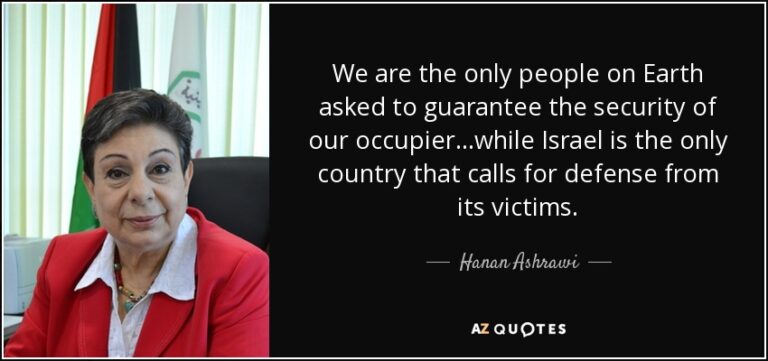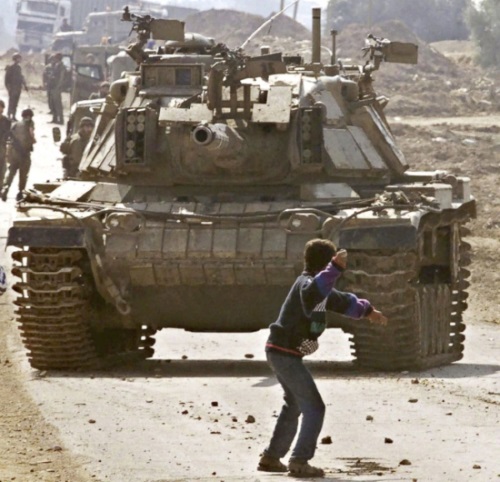Is The Era Of Let Bygones Be Bygones Gone?
On April 26, 1988, throngs of us Arabs sat in our living rooms mesmerized as we watched Ted Koppel’s Nightline. That evening, the ABC news show held a town hall meeting in Jerusalem that brought together a panel of three Palestinians and three Israelis. Moderated by Koppel, the two teams laid out their clashing narratives.
On the Israeli side, sat Ehud Olmert, Eliyahu Ben Elizar, and Deddi Zucker; on the Palestinian, Hanan Ashrawi, Saeb Erekat, and Haidar Abd al-Shafi. Between them, the six had the entire political scope of the conflict covered.

Throughout the three hours, we were erupting like Messi’s diehards in the Mondial. Finally! Professor Ashrawi, then the Dean of the Faculty of Arts at Beirzeit University in the West Bank, in a pitch perfect performance, humanized Palestine’s agony and personified its eternal dignity. Eloquent, measured, poised, knowledgeable, she left the Israeli panelists in the dust. Like a choir, she, Abd al-Shafi, and Erekat sang the Palestinian case, and their collective voice was electrifying.
They were not many, the likes of Ashrawi, on American television, but they were truly groundbreaking, none, of course, more terrifying to the Israelis than Edward Said. Through this small band of defenders of the Palestinian cause, we began to see new narratives share space with the Israeli one and envisioned breakthroughs we could build upon.

There was an immediate context to Ashrawi’s feat, and a larger one. More immediately, that week, ABC’s James Walker and Bill Blakemore, as part of their background coverage, had outlined for the viewer an unvarnished, fact-filled historical brief on the struggle for Palestine.
As if to allude to an original sin, Walker went back to the 1947 partition plan, explaining that the “Jews–who occupied only 6.5 percent of Palestine–were given control of 55 percent of the land.” To help sharpen the meaning of this allocation to his American audience, he likened it to Arizona and Utah being given over half of America. No less remarkable was his mention of the Israeli state’s rampage that destroyed close to 400 Palestinian villages, the purpose of which was “to wipe out the Palestinian civilization.”
Blakemore’s own segments offered more texture to the unfolding picture since the 1967 War and Israel’s conquest of the West Bank, East Jerusalem, and Gaza, describing in detail its method of collective punishment and defining its ejection of “many teachers, doctors, lawyers, journalists…” as an effort to empty the Occupied Territories of Palestinian brain power.
In very blunt language and with brute facts, two prominent American journalists had given Ashrawi all the backdrop she needed to bring home what had been happening in Palestine since 1947 to all those who did not know or pretended not to.
The larger context was the 1987 Intifada in the Occupied Territories and the images of Israeli soldiers shooting and breaking the bones of Palestinian teenagers armed with stones. The cracks in the Israeli tale were growing wider, it appeared clear to us, and the logical assumption was that the context, growing ever more palpable, would compel a Western (read US) pivot and lead to a “fair” solution to the Palestinian-Israeli debacle centered on two states.

And we thought so because, by 1988, the Camp David Accords between Egypt and Israel were nine years old, Yasser Arafat and the PLO were all but spent, an overstretched and very tarnished Israel was already struggling in its occupation of Southern Lebanon, and the Intifada was signaling that the internal Palestinian arena and non-violent resistance were replacing the external one.
In other words, on the matter of Palestine, we were upon the era of let bygones be bygones. For my generation, which came of political age in that decade, the mood was of a piece with the pragmatism and love of the piecemeal that had overtaken the political zeal and pipe dreams of yesteryear. It all kind of dovetailed inside and out.
As we marched, we did so to the chorus of the West, of course. When I say the West, I mean its officialdom and institutional representatives across spectrums. Many of us in the ranks of the liberal Arab elites who had studied there, lived its ways, imbibed its culture, spoke its language, and considered axiomatic its unmatched sway in our region, became its natural interlocutors–we assumed as equals, it has to be said.
There was nothing naïve about such an aspiration, nothing sentimental or trusting. We knew well the West’s hypocrisy and double standards, we knew even better its colonizing history and complicity in Palestinian dispossession. The fault was in the logic. We thought that if we let bygones be bygones, we would be able to transition from losers to protagonists. The times were evolving and if, indeed, the past and its injustices were helping inform the West’s present approach towards us, then the past and its grievances wouldn’t blind our attitude towards it. New order, new rules, new paths for engagement, notwithstanding the inevitable biases that intrude on all relationships.
And so, we transitioned. We launched a thousand conversations and offered a million nods. We explained and educated and listened and compromised in the name of a shared humanity and in the hope that with open dialogue and concessions comes a wiser policy. And then we discovered that the West had never meant to make the transition itself. For it, we were losers then, we are losers now. And towards losers, every exception to every Western rule may apply with little consideration or consequence.
If Israel’s rain of horrors on the Palestinians of Gaza since October 7 with the US and Europe’s full-throated endorsement says anything to us, it says precisely this.
It was the fate of Israel, ever since its creation in 1948, to be the litmus test of Western faithfulness to its lofty ideals and principles. Because in the origins of this state and in its conduct since, the West has had to confront its worst sins: culpability in centuries-long pogroms against its Jewish minorities and complicity in supporting a solution built on never ending Zionist recompense at the expense of another people.
It’s been 35 years since that night on April 26, 1988. Koppel is long retired, Nightlight is long gone, but tragically, Ashrawi is still making the rounds, pounding away about the plight of the Palestinians. Today, however, she has to add yet another three decades of Palestinian privation, during which Israel, under the very thin cover of the 1993 Oslo Accords, proceeded to eat into the little that remained of Palestine, puncture it with 750,000 settlers on hundreds of settlements, place Gaza in an iron cage, and establish itself in the West Bank and East Jerusalem as an apartheid state. And it did all this with European and American knowledge and consent. In the meantime, every method of Palestinian resistance has been condemned by them, as if to tell this people that the only protest acceptable is the faint whisper before death.

The West probably thinks the ruptures with us, the liberal Arab elites, will soon mend, all in the spirit of let bygones be bygones, I imagine. Or perhaps it could care less. My sense is that it’s wrong on both counts. In maintaining its relevance and influence in an increasingly competitive international arena, the Western league has been extolling the righteousness and superiority of its rules-based system. When it makes a mockery of its own rules and values, it makes a mockery of itself. And the truth is, it had been forever sliding on that yardstick well before October 7. Now it fades.
We are, in fact, upon a new era, and it goes by the name of J’Accuse. It transcends Arab generations and signals a new approach, legal, grassroots, no holds barred, social media savvy, unapologetic and uncompromising. It has allies and friends among many dissenting Western constituencies, including Jewish and Israeli voices. Its collective action is on display practically every day in every other European capital, in many American cities, on the internet, in mainstream media, at football stadiums, in court, in Silicon Valley, in parliament and congress…

We are done! There is no archive richer than the one on Israel’s history of subjugation and ethnic cleansing and Palestinian expulsion and suffering. There certainly is much explaining to be done, humanity to be shown, mea culpas to be offered, transitions to be made, but not by us.
Make no mistake: this breach is deep, vast, and long lasting.
****
On Another Note
Conversations on Israel-Palestine don’t get better than this one between Ezra Klein and Amjad Iraqi, a senior editor at +972 magazine and a policy analyst at the Al-Shabaka think tank. The discussion is sensitive, informed, layered, and candid. Perhaps the most interesting exchange was on the possibilities of a future for Israelis and Palestinians unshackled by the suffocating idea of the nation-state. Have a listen.
As genocide unfolds in Gaza, ethnic cleansing progresses in the West Bank. Neve Gordon, in a recent piece in the London Review of Books, offers a glimpse of what the Palestinians have been experiencing.
Dror Etkes, who has been monitoring Israel’s land grab for more than two decades, says:
There is no force within Israel that can [stop] or is interested in stopping the ethnic cleansing being carried out before our eyes. Therefore, the responsible and right thing for all Israeli human rights organisations to do is to issue a statement calling upon the international community to station a multinational force in the West Bank … A multinational force of this kind was deployed in Bosnia only after years of war and hundreds of thousands of deaths. Now is the time to bring a multinational force into the West Bank, before the massive ethnic cleansing takes place, before even more extensive lethal violence is unleashed.
As always, if you can’t access the article, I am happy to gift it to you.
